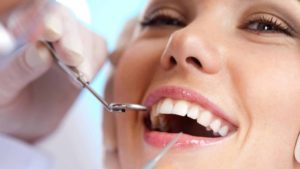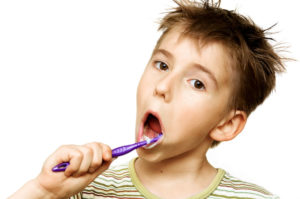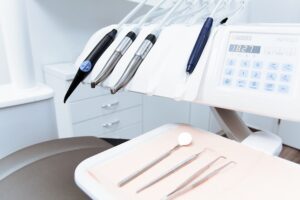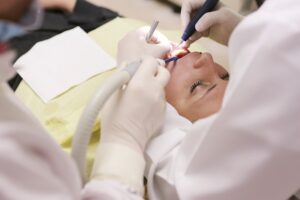Signs of Painless Dental Emergency

Is It a Dental Exigency If I’m Not In Physical Pain? Yes, it can be! There are several indications that you may be suffering from dental emergencies without physical pain. They include your teeth grinding together at night (bruxism), chronic bad breath, tooth discoloration resulting from smoking tobacco, and tender/sensitive gums around one particular area of your mouth, which often indicates a condition due to damage below the surface. All of these signs indicate something is seriously wrong with your oral health; however, even if you don’t feel any pain doesn’t mean there isn’t anything wrong with how well all of your teeth meet up when biting down on food or that something isn’t going on below the surface. You should take care of these symptoms immediately by making an appointment with a dentist to get checked out!
Dental emergencies are not always as they seem. This article will discuss some signs that you may be experiencing a dental emergency even if there is no physical pain. We want to allow you to make an informed decision about your oral health and whether or not it needs prompt attention from a dentist.
Tingling sensation
One of the most common forms of dental emergencies without physical pain is a tingling sensation or numbness in your mouth. This is typically a sign of nerve damage, and there are several causes, such as an impacted tooth or infection of the pulp tissue at the center of each tooth. Additionally, an abscessed tooth may cause this tingling sensation. This results from pressure buildup inside your tooth, which results in nerve damage and can be extremely painful in the long run.
Swelling on one side of the face
Another sign of dental exigency without physical pain is swelling on one side of your face or an inability to move part of your jaw, such as when teeth have shifted into their sockets. The muscles at the back of our jaws attach to these bones with ligaments called temporomandibular joints (TMJs). When there has been trauma—such as impacted wisdom teeth, injury from sports activities, etc.—this tissue can swell up, which will push against nerves causing extreme levels of pain. If ignored long enough, it can also affect how well you chew food. Chewing on the wrong side of your mouth is worse for TMJ sufferers because it puts pressure directly onto their joints.
Your teeth feel like they are grinding together
Another form of dental exigency without physical pain is when you feel like your teeth are grinding together. This is typically referred to as bruxism, and it’s not uncommon for people who grind their teeth at night. The full extent of the damage will depend on how often you do this, your genetic predisposition, what kind of toothpaste you use (some are better than others), if you drink coffee or other caffeinated drinks before bedtime, etc. Furthermore, if you clench or grind your teeth at night, it can cause severe damage to both each tooth’s enamel and the muscles in your jaw.
Chronic bad breath
Chronic bad breath is another dental emergency without physical pain. This is typically the result of an infection in your gums, caused by bacteria that accumulate between teeth or below the gum line. The main sign that you are experiencing these types of dental emergencies without physical pain is bad breath.
Teeth discoloration
Another form of dental exigency without painful symptoms may not seem like much. Still, it has become one of our biggest concerns at Gallardo because we have seen its effects on many patients who neglect their oral health over time—tooth discoloration resulting from smoking tobacco. The teeth of those who smoke turn yellowish-brown because a carcinogen in tobacco called hydrogen cyanide binds to tooth enamel, stains it, and makes each tooth appear darker.
Red or Swollen gums
Another sign that you may be experiencing dental emergencies without physical pain is if your gums have become red or swollen around one particular area of your mouth. This can indicate infection at the base of one specific tooth—especially when accompanied by tenderness or sensitivity to hot/cold foods and drinks—or even damage from trauma such as having bitten down on something hard like ice cubes with too much force. If this continues for more than 24 hours, you should immediately make an appointment since there could be severe damage below the surface that you cannot see.
If you are unable to chew
If you cannot chew food because there is an issue with one of your teeth, this may be a dental emergency without physical pain. If one tooth has lost its roots due to trauma or decay, chewing on that side will likely become very hard as time goes by. Not only do you risk fracturing sensitive nerves but also breaking off what’s left of that root inside of your mouth, which leaves behind sharp edges. This often results in infection down into the bone structure itself, which then becomes extremely difficult—or impossible—to treat without invasive surgery, resulting in severe consequences.
Numbness
Suppose there has been trauma to your mouth that causes numbness in one side or an inability to open fully. In that case, these should be considered dental emergencies without physical pain because they can lead to further complications like infections. Remember that although there may not be any physical pain associated with some oral health issues does NOT mean it isn’t essential! We recommend seeking treatment by a dentist immediately for any of these signs.
How to prevent Dental Exigencies
To prevent further problems, make sure that you brush your teeth at least twice a day and floss once daily. Don’t forget to schedule regular appointments to get checkups. Despite how well our teeth feel, it doesn’t always tell us everything about what may be going on below the surface, leading to more significant issues if left alone for too long!
Conclusion
If you have been experiencing these signs for at least a day or two, you might be suffering from some dental exigency without physical pain. However, this does not mean there isn’t anything wrong with your mouth. These symptoms typically indicate something seriously wrong with your oral health despite any physical pain.
If you have been diagnosed with a dental emergency without physical pain, it is essential to take care of an issue by following your dentist’s recommendations for treatment and recovery!






